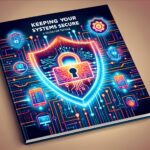In the fast-paced world of technology, it’s easy to get caught up in the excitement of new gadgets and software, but it’s important to remember the importance of keeping our systems secure. Computer security is an ever-evolving field, with new threats and vulnerabilities emerging all the time. As a technical audience, it’s crucial that we stay informed and proactive in protecting our systems from malicious actors. In this article, we’ll explore some best practices for keeping your systems safe and secure.
Understanding the Threat Landscape
Before we can effectively secure our systems, it’s important to understand the threats that we’re up against. Cybercriminals are constantly developing new tactics to infiltrate systems and steal sensitive information. From phishing attacks to ransomware, there are a variety of ways that hackers can compromise your systems. It’s crucial to stay informed about the latest threats and vulnerabilities so that you can take proactive steps to protect your systems.
Implement Strong Password Policies
One of the simplest yet most effective ways to improve your computer security is to implement strong password policies. Passwords are often the first line of defense against unauthorized access, so it’s important to choose passwords that are difficult to guess. Avoid using easily guessable passwords such as “password123” or “123456.” Instead, opt for long, complex passwords that include a mix of letters, numbers, and special characters. Consider using a password manager to securely store and manage your passwords.
Keep Software Up to Date
Software vendors regularly release updates and patches to address security vulnerabilities in their products. It’s important to install these updates promptly to protect your systems from potential security threats. Set up automatic updates whenever possible to ensure that your software is always up to date. In addition to updating your operating system and applications, don’t forget to update your antivirus software and other security tools regularly.
Secure Your Network
Securing your network is another essential aspect of computer security. Make sure that your network is properly configured, with strong encryption and authentication mechanisms in place. Consider using a firewall to monitor and control incoming and outgoing network traffic. Disable any unnecessary network services and ports to reduce potential attack vectors. It’s also important to secure your wireless network with a strong password and encryption protocol.
Back Up Your Data Regularly
Data loss can occur due to a variety of reasons, from hardware failures to ransomware attacks. To protect your valuable data, it’s important to back up your data regularly. Consider using a combination of on-site and off-site backups to ensure that your data is protected in the event of a disaster. Test your backups periodically to make sure that they are working properly and that you can restore your data when needed.
Conclusion
Computer security is a complex and ever-evolving field, but by following best practices and staying informed about the latest threats, you can effectively protect your systems from malicious actors. Implement strong password policies, keep your software up to date, secure your network, and back up your data regularly to minimize the risk of a security breach. Remember, the best defense against cyber threats is a proactive approach to computer security. By staying informed and taking proactive steps to protect your systems, you can stay one step ahead of the cybercriminals and keep your systems safe and secure.










